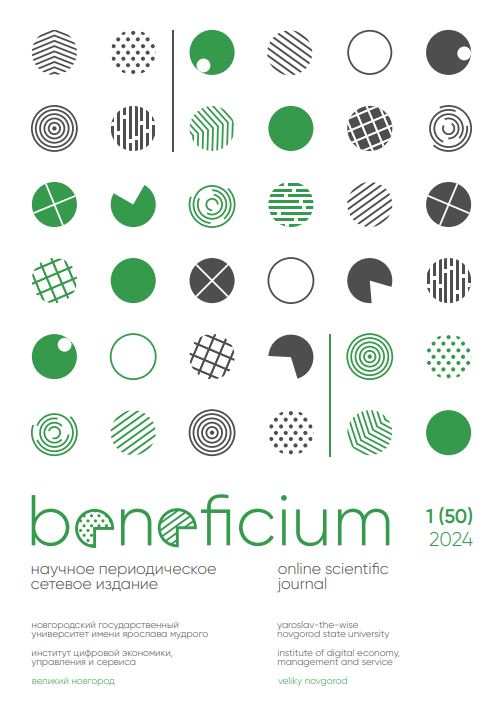RESEARCH ON THE RELEVANCE OF THE USE OF MACHINE LEARNING METHODS IN THE DIGITAL ECONOMY
Abstract
The paper investigates the main ways of studying the digital economy using machine learning methods and assesses the degree of their application in different sectors of the economy. Different points of view on the definition of the concepts of "digital economy" and "machine learning" are considered. The level of development and relevance of artificial intelligence and machine learning, as well as their multi-purpose use in various spheres of society are noted. The types of tasks, for the solution of which by means of machine learning methods the maximum efficiency and productivity are provided. The advantages and disadvantages of using machine learning methods are highlighted and disclosed in more detail. Based on the conducted collection and analysis of reporting data provided by the Federal State Statistics Service "Rosstat", the analysis, synthesis and correlation of indicators used to describe the position of machine learning methods in the digital economy are carried out. The most demanded areas of the digital economy from the point of view of applying machine learning algorithms were identified, each sector of which was hierarchically classified depending on the relevance of applying machine learning methods in it. The ways of categorizing machine learning methods into groups are described. The results of the study allow us to draw conclusions about the position of machine learning methods in the modern digital economy, the importance of their application and the need to train specialists in this field.
Keywords: data analysis, artificial intelligence, machine learning, methods of machine learning, digital economics
References
Chekhovych M.G., Poreva A.S., Timofeyev V.I., Henaff P. Using of the Machine Learning Methods to Identify Bronchopulmonary System Diseases with the Use of Lung Sounds // Bulletin of National Technical University of Ukraine. Series Radiotechnique. Radioapparatus building. 2018. Vol. 73. Pp. 55-62. DOI: 10.20535/RADAP.2018.73.55-62
Svishhev A.V., Gejker A.M. Primenenie bol'shih ob'emov dannyh i mashinnogo obucheniya v sel'skom hozyajstve [The use of large amounts of data and machine learning in agriculture] // E-Scio. 2021. Vol. 11(62). Pp. 283-291 (In Russ.).
Konev K.A. Machine Learning for Quality Decision Support in an Industrial Enterprise // Economics. Information technologies. 2023. Vol. 50(3). Pp. 689-703. (In Russ.). DOI: 10.52575/2687-0932-2023-50-3-689-703
Ponyrko R.M. The Impact of the Digital Economy on the Processes of the Banking Sector // Economic Sciences. 2020. Vol. 188. Pp. 66-70. (In Russ.). DOI: 10.14451/1.188.66
Urlapov P.S. Machine Learning in Banking Risk Management // Modern Economy Success. 2021. Vol. 1. Pp. 113-118. (In Russ.).
II na sluzhbe v banke [AI in the service of the bank] (2020). Rspectr. (In Russ.). URL: https://rspectr.com/articles/ii-na-sluzhbe-v-banke (accessed on 10.10.2023).
Orlova E.V. Decision-Making Techniques for Credit Resource Management Using Machine Learning and Optimization // Information. 2020. Vol. 11(3). 17 p.
Sozykina M.S. Ponyatie cifrovoj ekonomiki v Rossii [The concept of the digital economy in Russia] // Achievements of science and education. 2018. Vol. 18(40). Pp. 25-27. (In Russ.).
Artificial Intelligence Techniques (2023). EDUCBA. URL: https://www.educba.com/artificialintelligence-techniques/ (accessed on 15.09.2023).
Russell S.J., Norvig P. Artificial intelligence: A Modern Approach. Publisher: Prentice Hall. 2010. 1152 p.
Seydametova Z.S. Мachine Learning Problems and Algorithms: Probilistic Graphical Models // Information and computer technologies in economics, education and the social sphere. 2019. Vol. 1(23). Pp. 180-187 (In Russ.).
Ispol'zovanie cifrovyh tekhnologij organizaciyami po Rossijskoj federacii. sub"ektam Rossijskoj Federacii i vidam ekonomicheskoj deyatel'nosti [Use of digital technologies by organizations in the Russian Federation. constituent entities of the Russian Federation and types of economic activity] (2023). Federal State Statistics Service "Rosstat". (In Russ.). URL: https://rosstat.gov.ru/storage/mediabank/ikt-org.xlsx (accessed on 23.10.2023).
Abdrakhmanova G.I., Vasilkovsky S.A., Vishnevsky K.O. [et al.]. Cifrovaya ekonomika: 2023: kratkij statisticheskij sbornik [Digital economy: 2023: a brief statistical collection]. M.: National Research University Higher School of Economics. 2023. 120 p. (In Russ.).
Investicii v II-sektor upali na tret' [Investments in the AI sector fell by a third] (2023). Kommersant.ru (In Russ.). URL: https://www.kommersant.ru/doc/6310999 (accessed on 16.10.2023).
About the Authors
Yegor S. Paramonov – Student, Kuban State Agrarian University named after I.T. Trubilin, Krasnodar, Russia. E-mail: iamnotraitor@mail.ru
Konstantin A. Ivantsov – Student, Kuban State Agrarian University named after I.T. Trubilin, Krasnodar, Russia. E-mail: konstantin.ivanyov@mail.ru
Vadim A. Mironchuk – Cand. Sci. (Economics), Docent; Associate Professor, Kuban State Agrarian University named after I.T. Trubilin, Krasnodar, Russia. E-mail: mailto:mironchuk.v@edu.kubsau. SPIN РИНЦ 8042-8904. ORCID 0000-0001-9160-4704. Scopus Author ID 57221048524
For citation: Paramonov Y.S., Ivantsov K.A., Mironchuk V.A. Research on the Relevance of the Use of Machine Learning Methods in the Digital Economy // Beneficium. 2024. Vol. 1(50). Pp. 22-30. (In Russ.). DOI: 10.34680/BENEFICIUM.2024.1(50).22-30









